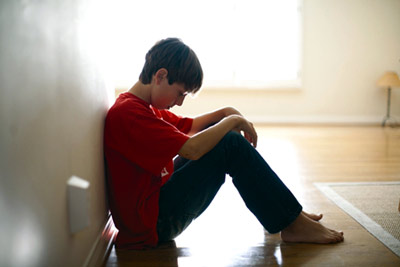Handle your teenager with care
By Lionel Wijesiri
They say being a parent is the toughest job in the world. It can
certainly feel that way during the teenage years of their children. For
many parents, their teenager’s behaviour can be baffling, stressful,
hurtful and often worrying. However, it doesn’t mean that there is
anything serious going on than the natural process of becoming an adult.
|

No matter how grumpy your child gets, he still values your
communication. |
Children show the onset of adolescence with a dramatic change in
behaviour towards their parents. They start to distance themselves from
parents and become more independent. At the same time, they begin to get
increasingly aware of how others, especially their peers, see them and
try to fit in to that particular “clique.” Their peers often become much
more important, as compared with their parents, in terms of making
decisions.
As teenagers mature, they begin to think more abstractly. They form
their own moral codes. Parents may find that their children who
previously had been willing to conform to their rules and regulations
will suddenly begin asserting themselves - and their own opinions -
strongly and rebelling against parental control.
Let us take a typical conversation:
You - ‘How’s your revision going, son?’
Your child - ‘Why are you checking up on me? Don’t you trust me? I
always get good marks, so why ask me about it?’
You - ‘I was only asking. I just wanted to know if you’re going OK
with it ...’
Your child - ‘Sure you were ...you always try to pry on me…Leave me
alone, please’
As a parent, you will feel hurt, worried and maybe, angry about
what’s happened when you have a conversation like this. Your child used
to value your interest or input, but now it seems that even the simplest
conversations can turn into arguments.
What would you do? React viciously? Start a confrontation ending up
with you physically hurting the child. Such action would not solve the
issue. It might even worsen it.
First of all, try to understand that there are reasons for your
child’s behaviour. (And there’s also good news: this phase will last
only a few years.) Remind yourself that they are in an essential part of
puberty and growing up. Surges of hormones, combined with body changes
are struggling to find an identity and a developing sense of
independence. This means the teenage years are a confusing time for your
child, also.
Not that your child was rude or disrespectful, but acting like this
is a normal part of teenage growth and development.Your child is
learning to express and test out his own independent ideas, so there
will be times when you disagree.
You may need to look closely at how much room you give your teenager
to be an independent individual and ask yourself questions such as: “Am
I a controlling parent?,” “Do I listen to my child?,” and “Do I allow my
child’s opinions and tastes to differ from my own?” You’re the adult,
and it is your responsibility to guide them through difficult times.
Don’t expect to enjoy your time with them all of the time, and
remember to look after yourself.
Behaviour patterns
|

A punished child becomes preoccupied with feelings of anger and
fantasies of revenge. |
Modern child behaviour scientists also say that teenagers can be
quite moody because of how their brains develop and change. The changes
going on, especially those affecting the emotional centre of the brain,
can sometimes lead to over-sensitivity, as well as changeable moods or
attitudes.
Teenagers are starting to think in a deeper way than they did a few
years earlier, and they can have thoughts and feelings they have never
had before.
They seem to burst into the world with a contrary and radical view on
everything. This shift to deeper thinking is also a normal part of
development.
Pressure
The happy part of the story is that no matter how grumpy or cross
your child gets, he still values your communication. It’s important to
keep talking to him - you just might need to be a little more patient
and understanding if he is short-tempered or moody.
Don’t make the mistake of trying to get your child to “want” to have
good grades, or “want” to get a good job.That’s not likely to happen,
either. You are not going to transform your child’s attitude about the
world, or their place in it. Rather, it’s your responsibility as a
parent to help your child learn the skills he needs to make his way in
the world.
You never know, maybe he will get a job as a certified ethical
hacker, if that’s what he really want! Just don’t try to convince him
that you are right and he is wrong. Don’t try to get him to stop
resisting and start being “realistic.”
Instead, focus on the behaviour you would like to see change, and
ignore the attitude. Focus on getting your teenager to meet his
responsibilities in here and now - homework, chores. Once he concludes
his education, he is free to use the skills you’ve helped them learn -
or not.
Hints
Experts give few hints how you could handle your teenager’s
disrespectful behaviour.
Stay calm. This is important if your child reacts with ‘attitude’ to
a discussion. Stop, take a deep breath, and move off. Continue calmly
later with what you wanted to say.
Focus on the behaviour, not the person. When you need to talk about
some disrespectful behaviour, focus on the behaviour and how you feel
about it. Avoid any comments about your child’s personality or
character. Instead of saying, “You’re rude”, you could try saying
something like, “I feel hurt when you speak like that to me”.
Be a role model. When you’re with your child, try to speak and act
the way you want your child to speak and act towards you.
Praise your teenager for positive communication and achievements.
When you have a positive interaction, point this out to your child. This
lets her know you’re aware of and value her opinions.
Use humour. A shared laugh can break a stalemate, offer a different
perspective on a situation, or lighten the tone of a conversation. Being
light-hearted can also help take the heat out of a situation - but avoid
mocking, ridiculing or being sarcastic.
Sometimes teenagers are disrespectful without meaning to be rude. A
useful response can be something like, ‘That comment came across as
pretty offensive. I am sure you did not want to be rude’.
And above all, do not physically punish your teenager. Some parents
hit their children because they are angry and have lost their temper.
A physically punished child becomes preoccupied with feelings of
anger and fantasies of revenge, and is thus deprived of the opportunity
to learn more effective humane methods of solving the problem at hand.
Physical punishment also interferes with the bond between parent and
child, as it is not human nature to feel loving toward, someone who
hurts us. Such punishment, even when it appears to work, can produce
only superficially good behaviour based on fear, until the child is old
enough to resist.
Just as important as analysing their teenager’s behaviour, parents
need to look closely at what they themselves are doing and how they
respond to situations.
If parents can change their reactions and the types of consequences
used to deal with the teenager, they in turn may modify their teenager’s
behaviour and help him mature into a happy, successful young adult.
It’s all in the hands of parents. (For
comments contact [email protected])
|

